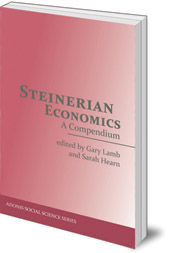Quick Look
- A comprehensive collection of Rudolf Steiner’s statements on economics
- Offers an alternative, collaborative approach to financial systems
A comprehensive collection of Rudolf Steiner's statements on economics, which offers an alternative, collaborative approach to financial systems.
Description
Rudolf Steiner developed a comprehensive view of social life which he viewed as being made up of three inter-dependent realms: spiritual-cultural, political and economic. Out of this grew his philosophy known as 'associative economics', which in contrast to our global financial systems, is collaborative and serves the real needs of consumers.
This book, a companion to Gary Lamb's Associative Economics, is a comprehensive collection of Rudolf Steiner's statements on economics, compiled from all of his works currently available in English. It will be an indispensable resource for anyone interested in alternative approaches to our current financial crises.
Table of Contents
Foreword
Editors’ Introduction
Whom is this Economics Compendium for . . . and not for?
The Path We Traveled
Ways to Use This Compendium
The Compendium as a Thought Organism
Clarification of Some Important Terms
Repetition of Some of the Quotations
Editing of Quotations
Acknowledgements
1. Social and Antisocial Forces
in the Human Being and Social Life
The Need for Inner and Outer Change
Rising Individualism and Antisocial Forces
The Interplay of Sleeping and Waking in Human
Taking Greater Interest in Others: The Foundation of Social Life
Creating Social Forces by Consciously Fostering Interest in Others
Interest in Others and Economic Life
From Personal Opinion to Collective Wisdom
2. The Fundamental Social Law
Egoism and Self Interest in Social Life
Egoism and Altruism
Spiritual Worldview
Community Spirit and Spiritual Mission
The Influence of an Independent Cultural Life
Rights Life and the Will to Work
Labor as a Rights or Equity Issue Rather Than an Economic One
Fostering Altruism by Overcoming Labor as a Commodity
Ways to Overcome Paid Labor
3. The Threefold Social Organism
Healthy Social Life is Threefold
National and International Relations
Transgressing Boundaries as a Main Cause of Social Problems
Cultural Freedom Begins with Educational Freedom
The Economy and the Political State
Implementing Social Threefolding
The Relation of the Physiological and Social Organisms
True Social Renewal Requires a Change in Thinking
4. Economic Science
The Evolution of Economic Life
From World Trade to World Economy
Constant Fluctuations within the World Economy
Picture-Thinking
Economics and the Color Spectrum
Viewing the Economic Process from the Inside
Elements of a New Method for Economic Science
5. Economic Associations
Characteristic Features and Dynamics
Evolution of the Role of the Individual and the Need for Associations Today
Informed, Transparent, and Freely-Formed Agreements
Economic Judgments Via Living Associations
Insight, Collective Consciousness, and Group-Born Intelligence
Balancing Egoism and Love in Economic Life
Answering the Need for Constant Price Corrections
From Profit Motive to Satisfaction of Human Needs
A New Relation of Management and Investors to Workers
Associations in Relation to Gift Money and Cultural Life
Implementing Economic Associations
6. Economic Values
The Economic Process as Context for Economic Value
Origin of Economic Values: Labor Transforming Nature
Diagram 1: Value Creation
Value Creation through the Human Spirit, or Intelligence Transforming Labor
Fluctuating Character of Economic Values
Consumer Needs and Value Creation
Socially Correct Value
Consumption, Elimination of Value, and Value-Creating Tension
Values and Spiritual-Cultural Work
Machines and Cultural Productivity
7. Capital
The Social Necessity and Benefit of Free Access to Capital and Property Rights
Administration and Transference of Capital
Profit Motive and Capital Increase
Land and Capital
Diagram 2: Economic Cycle: Nature, Labor, Capital
Surplus Capital
Redefining Ground-Rent and Calculating Subsistence Income
Land Rent as Capital and the Support of Cultural Life
8. Credit.
Motivation
Capability
Mutuality and the Service of Lending
Personal and Real Credit
The Role of Associations in the Giving and Receiving of Credit
The Coming Day (Der Kommende Tag) Experiment
9. Money
Money as a Measure of Economic Value
The Illusory Nature of Money as a Commodity
Money as Power
Money as Rights and Cultural Capacities Realized
Money as Spirit Realized
Money as Bookkeeping and Medium of Exchange
A New Basis for Determining the Value of Money (Currency)
The Relation of Money to Value of Cultural and Political-Legal Work
Impersonal Nature of Modern Banking and Finance
Taxation
Aging Money
Purchase, Loan, and Gift Money
Diagram 3: Money Cycle: Payment, Loan, Gift
Issuing Currency
Inflation
Money as a Means to Exercise Social Responsibility
10. Price Formation
True Price
Falsification of Prices
Price Fluctuation
Associations and Price Regulation
Fundamentals of Pricing
11. The Interplay of Spiritual-Cultural and Economic Life
Constructive Forces of Spiritual-Cultural Life
Capacities and Capital
Financial Support of Cultural Life
Freedom and Funding in Education
Value of Spiritual Work for the Economy as a Whole
Resources
A Selection of Publishers of Rudolf Steiner’s Social and Economic Writings and Lectures in English
Basic Texts by Rudolf Steiner on the Threefold Social Organism, Associative Economics, and the Fundamental Social Law
Texts by Other Authors
Businesses, Organizations, & Initiatives inspired by Rudolf Steiner’s Social and Economic Ideas
Organizations and Initiatives Working to Some Degree in Harmony with Rudolf Steiner’s Ideas
Bibliography
Author
Gary Lamb is co-director of the Hawthorne Valley Center for Social Research in New York state. He is a board member for the Institute for Social Renewal and was previously managing editor of The Threefold Review.

